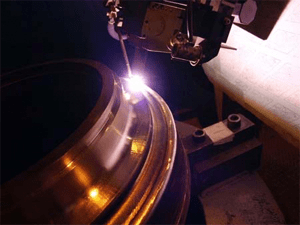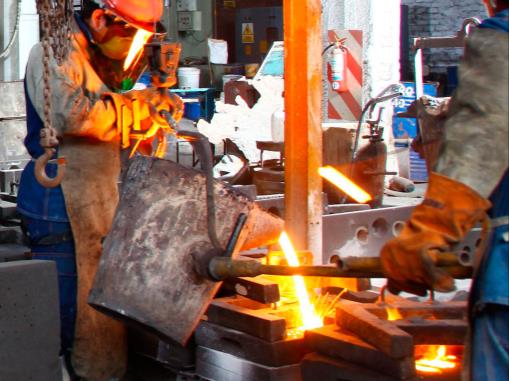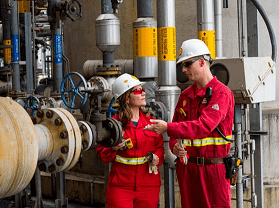COURSE OVERVIEW
FE0433 : Welding Defects Analysis

OVERVIEW
| COURSE TITLE | : | FE0433 : Welding Defects Analysis |
| COURSE DATE | : | Jan 26 - Jan 30 2025 |
| DURATION | : | 5 Days |
| INSTRUCTOR | : | Mr. Mohamed Kader (FE) |
| VENUE | : | Dubai, UAE |
| COURSE FEE | : | $ 5500 |
Course Description
This practical and highly-interactive course includes practical sessions and exercises where participants carryout welding inspection. Theory learnt in the class will be applied using our state-of-the-art simulators.
This course is designed to provide participants with an up-to-date overview on welding defects analysis. It covers the identification of various welding imperfections and defects; the relevant welding technology related to visual inspection, documentation in welding and code and standards related to inspection requirements; the proper inspection of parent materials and consumables; the visual inspection of welds; the reporting and assessing with specified acceptance criteria; the factors which influence the quality of fusion welds in steels; and the characteristics of commonly used welding process in relation to quality control and specifications of drawing instructions and symbols.
The course will further discuss the validity of a welding procedure; the origin of weld defects; the features of a fracture surface; the detailed reports plan, the use of skilled inspectors and NDT personnel; the various types of weld defects and how it is expected to appear on a radiographic image and what causes them; the gas pour, linear porosity and lack of fusion; and the various types of cracks and weld repair methods.
During the course, participants will be able to cover the theoretical background of phased array applications; the scan data for location and size of defects in typical welded butt joints; the basic theory of X- and gamma radiography and radiograph; the proper radiographic techniques and the difference between film faults and defect indications; the basic principles of magnetic particles inspection methods; the magnetic particle inspection and detection of cracks, surface and near-surface in welds; the PWSCC effects on reactor welds; the reactor vessel nozzle weld problems, the hellion time effect on aging reactor welds; and the stream generator weld problems.
link to course overview PDF
TRAINING METHODOLOGY
This interactive training course includes the following training methodologies:
LecturesPractical Workshops & Work Presentations
Hands-on Practical Exercises & Case Studies
Simulators (Hardware & Software) & Videos
In an unlikely event, the course instructor may modify the above training methodology for technical reasons.
VIRTUAL TRAINING (IF APPLICABLE)
If this course is delivered online as a Virtual Training, the following limitations will be applicable:
| Certificates | : | Only soft copy certificates will be issued |
| Training Materials | : | Only soft copy materials will be issued |
| Training Methodology | : | 80% theory, 20% practical |
| Training Program | : | 4 hours per day, from 09:30 to 13:30 |
This course is no longer available.
Please check below for other scheduled dates.
OTHER SCHEDULED DATES
| Refrence | Date | Location | Instructor | Fee (USD) | Outline | Actions |
|---|---|---|---|---|---|---|
| FE0433 | Feb 01 - Feb 05 2026 (5 Days) | Dubai, UAE | Mr. George Poulos | $ 5,500 | Outline | |
| FE0433 | Apr 26 - Apr 30 2026 (5 Days) | Doha, Qatar | Mr. Mohamed Kader (FE) | $ 6,000 | N/A | |
| FE0433 | May 17 - May 21 2026 (5 Days) | Seville, Spain | Mr. Mohamed Kader (FE) | $ 8,800 | N/A | |
| FE0433 | Jul 06 - Jul 10 2026 (5 Days) | London, United Kingdom | Mr. Mohamed Kader (FE) | $ 8,800 | N/A | |
| FE0433 | Aug 16 - Aug 20 2026 (5 Days) | Dubai, UAE | Mr. Mohamed Kader (FE) | $ 5,500 | N/A | |
| FE0433 | Oct 18 - Oct 22 2026 (5 Days) | Istanbul, Turkey | Mr. Mohamed Kader (FE) | $ 6,000 | N/A | |
| FE0433 | Nov 22 - Nov 26 2026 (5 Days) | Cairo, Egypt | Mr. Mohamed Kader (FE) | $ 5,500 | N/A | |
| FE0433 | Jan 17 - Jan 21 2027 (5 Days) | Doha, Qatar | Mr. Mohamed Kader (FE) | $ 6,000 | N/A | |
| FE0433 | Feb 08 - Feb 12 2027 (5 Days) | Seville, Spain | Mr. Mohamed Kader (FE) | $ 8,800 | N/A | |
| FE0433 | Mar 21 - Mar 25 2027 (5 Days) | Istanbul, Turkey | Mr. Mohamed Kader (FE) | $ 6,000 | N/A |
RELATED COURSES

FE1021 : Materials and Testing Foundation
- Date: Mar 29 - Apr 02 / 3 Days
- Location: Istanbul, Turkey
- Course Details Register

FE0985 : Thermal Infrared Testing Level-I Training & Certification (SNT-TC-1A)
- Date: Mar 14 - Mar 18 / 3 Days
- Location: Cairo, Egypt
- Course Details Register

FE0928 : Metallurgy for Non Metallurgist
- Date: Mar 29 - Apr 02 / 3 Days
- Location: Doha, Qatar
- Course Details Register

FE0570 : API 579-1/ASME FFS-1: Fitness-for-Service (FFS) of Process Plant Equipment, Pressure Vessels, Piping & Storage Facilities
- Date: Mar 29 - Apr 02 / 3 Days
- Location: Al Khobar, KSA
- Course Details Register
